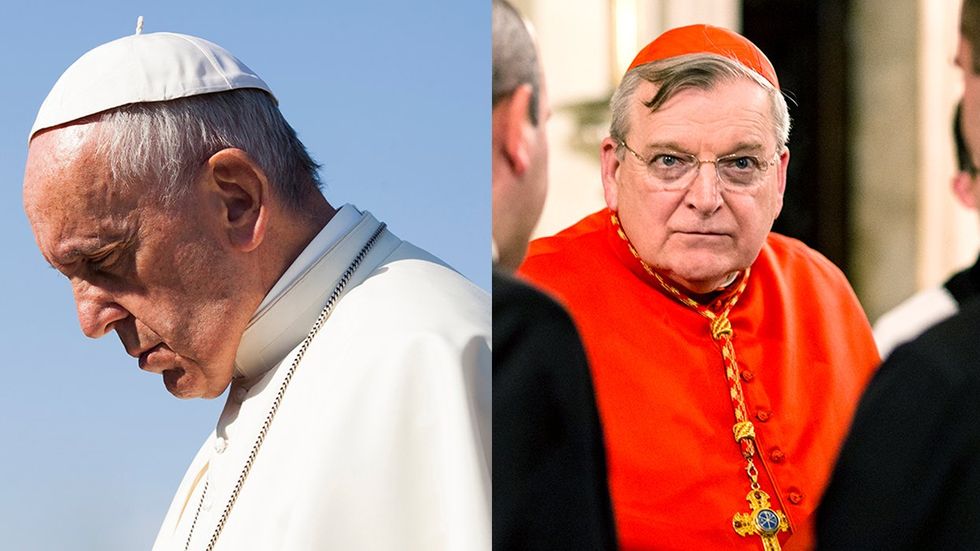Pope Francis has revoked retired Cardinal Raymond Burke’s salary and his right to a subsidized apartment in the Vatican.
The staunchly anti-LGBTQ+ Burke has been one of the most vocal critics of the pope’s outreach to the queer community and other liberal moves.
“Francis told a meeting of the heads of Vatican offices last week that he was moving against Burke because he was a source of ‘disunity’ in the church,” the Associated Press reports, citing an anonymous source. Burke hadn’t received any notice of the action as of Tuesday, his secretary told the AP. A Vatican spokesman contacted by The New York Timeswouldn’t confirm or deny the report.
“Almost as soon as Pope Francis became the head of the Roman Catholic church in 2013,” the Times notes, Burke “emerged as his leading critic from within the church, becoming a de facto antipope for frustrated traditionalists who believed Francis was diluting doctrine.”
Most recently, Burke was one of five retired cardinals who submitted questions to the pope on his stances on a variety of issues, including marriage equality and same-sex unions, women in the priesthood, and who is the ultimate worldly authority of the Catholic Church. Francis responded by indicating he would be open to some form of blessing for same-sex unions, although he said they should not be considered marriages, and said the ordination of women “can be the object of study.” He did not make any definitive changes, however.
Burke’s anti-LGBTQ+ views are in keeping with church doctrine that gay sex is a sin and that gender is fixed at birth, but he has often been more hostile to the LGBTQ+ community than other Catholic leaders.
In 2003, as a bishop of Wisconsin, he ordered the church-supported Central Wisconsin HIV/AIDS Ministry Project to cease participating in the state’s AIDS walk or accepting any of the funds raised because, he said, some of the other groups that benefit from the walk “actively and publicly promote homosexual activity.”
Burke went on to become archbishop of St. Louis, where he served from 2004 to 2008, then headed the church’s highest court. He was appointed to the court position by Francis’s immediate predecessor, conservative Pope Benedict XVI, but was removed from that post by Francis in 2014. He has continued speaking out against the LGBTQ+ community as a retired cardinal.
In 2013, he said the U.S. Supreme Court’s decision striking down the antigay Defense of Marriage Act would “lead to death for individuals and eventually it will destroy our culture.” The following year, he denounced a Vatican document that said there can be positive aspects to same-sex relationships and that the church should be more welcoming to LGBTQ+ people. In 2015, he blamed gay priests and what he called a “feminized” Catholic Church for the widespread sexual abuse of children by clergy members.
In March 2020, as many churches began holding services remotely in response to the COVID-19 pandemic, he said faithful Catholics should attend Mass in person to fight changes in the culture, including recognition of transgender identity. “We need only to think of the pervasive attack upon the integrity of human sexuality, of our identity as man or woman, with the pretense of defining for ourselves, often employing violent means, a sexual identity other than that given to us by God,” he wrote on his website at the time. “With ever greater concern, we witness the devastating effect on individuals and families of the so-called ‘gender theory.’”
Burke was a COVID vaccine skeptic, even repeating a conspiracy theory that vaccines included microchips with which governments could monitor people’s movements. He contracted COVID in 2021.
This is Pope Francis’s second recent action against a major critic. This month he removed Bishop Joseph Strickland as head of the diocese of Tyler, Texas. Strickland had accused Francis of undermining the faith through his tentatively liberal moves, including his welcoming attitude toward LGBTQ+ people.
Pictured, from left: Pope Francis and Cardinal Raymond Burke


















































































Fans thirsting over Chris Colfer's sexy new muscles for Coachella